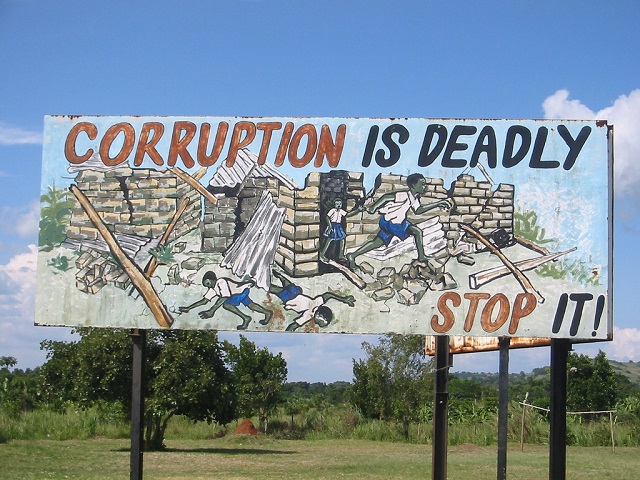 Ugandan anti-corruption sign futureatlas.com
Ugandan anti-corruption sign futureatlas.com
Why nations fail is a question that has long troubled social scientists. One of the most commonly cited explanations is that corruption—the bribes, nepotism, and tax avoidance that deplete the public purse and enrich private citizens—is to blame. Over time, corruption gradually undermines the state and can eventually lead to its collapse.
Dr Michael Muthukrishna of the Department of Psychological and Behavioural Science has a new study looking at the dynamics of corruption. His work supports the theory that corruption is inevitable due to evolved human behaviour; the challenge is to find the conditions where corruption can be minimised.
“Corruption is actually a form of cooperation rooted in our history, and easier to explain than a functioning, modern state. Modern states represent an unprecedented scale of cooperation that is always under threat by smaller scales of cooperation. What we call ‘corruption’ is a smaller scale of cooperation undermining a larger-scale,” Dr Muthukrishna says.
One of the smallest scales of cooperation is the family. “It's perfectly natural to want to help and protect your family members—it’s something we share with other animals."
"Evolutionary biological theories of kin selection or inclusive fitness do a good job explaining why we love our families and why every animal tends to favour other animals who share more of their genes,” Dr Muthukrishna says.
“This means it’s easy for family bonds to be prioritised over the needs of the state. It is no coincidence that places that have a family-oriented culture also have high levels of nepotism,” he adds.
A slightly larger scale of cooperation is cooperation between friends. “Theories of direct reciprocity—you scratch my back, I’ll scratch yours—can explain friendship. But when a manager gives a job to his buddy rather than to someone who could do the job better, this is corruption. It happens a lot, and it undermines the more efficient meritocracy,” Dr Muthukrishna explains.
To deter cooperation at the levels of friends and family from undermining large-scale, diverse and anonymous societies, the resources and economic opportunities of the state are helpful. But governments often lack the resources to police an entire population, so norms that make corruption socially unacceptable can also support cooperation at the level of the state.
“Alongside strong institutions like the judiciary and the police, there also needs to be a social stigma associated with corruption. The shame of being exposed for receiving bribes or evading tax scares people into not doing it,” Dr Muthukrishna says.
“The evolution of this cultural norm depends on economic opportunities that exist for cooperating at a state-level, or whether citizens have to rely on friends and family to get by,” he adds.
Corruption is present in both rich and poor countries and may even be larger, in an absolute sense, in richer countries. But its costs are felt more in poor countries, where governments do not have the capacity to sustain large-scale cooperation. In poor countries, corruption can mean the difference between one hospital or no hospitals, rather than 33 instead of 30 hospitals.
“The question in poor countries is not whether you should take a bribe, but how much money you should take. This is because there are many fewer ways of legitimately making money in these places,” Dr Muthukrishna says.
A common remedy proposed to tackle corruption in poor countries is transparency. In theory, shining a light into the corners of government and society makes the public aware of what is going on and should decrease the type of cooperation that undermines the state.
Dr Muthukrishna conducted experiments to replicate the effects of bribery and test the impact of transparency. He asked 194 participants to play an economic game that simulated the trade-off between cooperation and corruption.
The experiment tested how different levels of transparency affected behaviour in different situations, varying economic opportunities and state resources to tackle corruption.
Dr Muthukrishna’s findings showed that transparency only reduces corruption if economic opportunities exist or the state is strong and wealthy enough to punish individuals who break the law. If neither of these criteria is met, transparency is ineffective—or can make things worse.
“In poorer countries, transparency can reinforce the norm that most people are engaging in corrupt behaviours. These range from little behaviours like using your connections to get your visa more quickly, to large behaviours like giving government contracts to your friends and relatives,” Dr Muthukrishna says.
“In these cases, transparency not only reveals that corruption is the normal behaviour, but solves a different problem. It’s not a question of ‘should I bribe’—transparency reveals the price of the bribe,” he adds. This insight may help explain why transparency seems to work well in wealthy western nations, but has failed in many developing nations.
The debate over how to eradicate corruption tends to focus on a familiar set of remedies. Dr Muthukrishna’s research suggests that what is effective in the West may not be the silver bullet that works elsewhere and may, in fact, backfire.